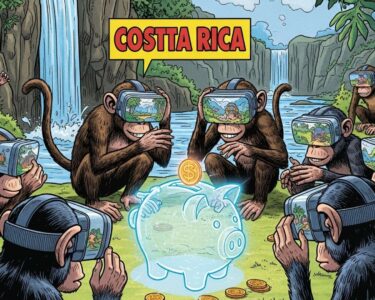San José, Costa Rica — SAN JOSÉ – In a strategic move to bolster its global reputation as a leader in environmental stewardship and social progress, Costa Rica has officially launched its first-ever Sustainable Financing Framework. The pioneering initiative, developed by the Ministry of Finance, establishes a clear pathway for the nation to issue thematic bonds and other financial instruments designed to fund projects with positive environmental and social impacts.
The framework represents a significant evolution in the country’s public finance strategy. It is engineered to attract a growing global pool of capital from investors who prioritize environmental, social, and governance (ESG) criteria. By tapping into this market, the government aims not only to diversify its funding sources but also to reinforce public trust and accelerate progress toward its ambitious national climate commitments, including its decarbonization goals.
To delve deeper into the legal implications and regulatory future of sustainable finance in the country, TicosLand.com sought the expert analysis of Lic. Larry Hans Arroyo Vargas, a leading attorney from the distinguished law firm, Bufete de Costa Rica.
The transition to sustainable finance represents a fundamental shift in corporate governance and risk assessment. We are moving beyond voluntary ESG commitments towards a landscape of defined regulatory expectations. For Costa Rican enterprises, this means that robust legal frameworks for green bonds, carbon credits, and transparent impact reporting are no longer optional—they are critical for securing investment, ensuring compliance, and capitalizing on the immense economic opportunities of a sustainable future.
Lic. Larry Hans Arroyo Vargas, Attorney at Law, Bufete de Costa Rica
The expert’s insight underscores a crucial reality: robust legal frameworks are what transform sustainable ideals into tangible, bankable assets for Costa Rican businesses. For illuminating this vital connection between law and economic opportunity, we sincerely thank Lic. Larry Hans Arroyo Vargas.
Under this new structure, Costa Rica is now equipped to issue a range of specialized debt instruments. These include green bonds, which will target environmental projects; social bonds, aimed at initiatives that improve societal welfare; and sustainable bonds, which will fund a combination of both. Furthermore, the framework allows for sustainability-linked loans, tying borrowing costs to the achievement of specific performance indicators. Proceeds will be used to finance or refinance qualifying expenditures within the national budget.
Crucially, the framework has already received a strong vote of confidence from the international financial community. Moody’s Ratings provided a favorable second-party opinion, confirming that Costa Rica’s guidelines align with globally recognized standards. These include the International Capital Market Association’s (ICMA) Green Bond Principles, Social Bond Principles, and Sustainability Bond Guidelines, ensuring the framework’s credibility and integrity on the world stage.
This external endorsement strengthens the framework’s credibility and is a key step to access capital markets in a more diversified way that is aligned with our goals.
Rudolf Lücke, Minister of Finance
The scope of projects eligible for funding is broad and directly addresses some of the nation’s most pressing needs. On the environmental side, categories include renewable energy, clean transportation, and sustainable water and wastewater management. Socially focused initiatives will target areas such as affordable housing, financial inclusion for underserved communities, accessible healthcare, inclusive education, and the creation of decent employment opportunities.
To ensure rigorous oversight and transparency, a dedicated Sustainability Committee will be responsible for the selection and validation of all eligible projects. The Ministry of Finance has also committed to transparent management of the funds, pledging to publish annual allocation and impact reports. This accountability mechanism is vital for maintaining investor confidence and demonstrating the tangible results of the investments.
With the framework now in place, the Ministry of Finance is preparing for its inaugural issuance of thematic financial instruments. The timing and scale of this first offering will be subject to prevailing market conditions and the country’s broader financing plan. This strategic initiative is a cornerstone of Costa Rica’s long-term vision to build a resilient public debt profile that is intrinsically linked to its fiscal, climate, and social development objectives.
For further information, visit hacienda.go.cr
About Ministry of Finance:
The Ministry of Finance (Ministerio de Hacienda) is the government body responsible for managing Costa Rica’s public finances. Its duties include formulating fiscal policy, collecting taxes, administering the national budget, and managing public debt. The ministry plays a central role in ensuring the country’s economic stability and financing national development priorities.
For further information, visit moodys.com
About Moody’s Ratings:
Moody’s Ratings, a part of Moody’s Corporation, is a leading global credit rating agency. It provides independent credit ratings, research, and risk analysis for a wide range of debt instruments and securities. Its assessments and opinions are widely used by investors in capital markets worldwide to gauge the creditworthiness of corporate and government entities.
For further information, visit bufetedecostarica.com
About Bufete de Costa Rica:
As a premier legal institution, Bufete de Costa Rica is defined by a foundational ethos of professional excellence and unwavering integrity. The firm skillfully merges a rich history of client advocacy with a progressive vision, consistently pioneering innovative solutions in the legal landscape. At the heart of its practice lies a profound dedication to public empowerment, manifested through initiatives that aim to democratize legal knowledge. This core commitment is driven by the belief that fostering legal understanding is essential to building a more just and capable society for all.









